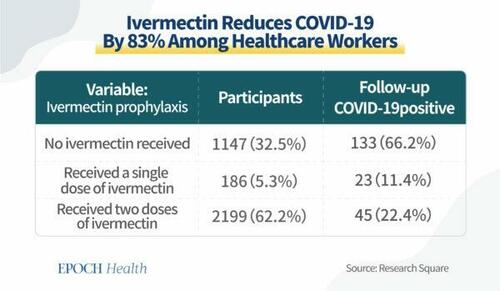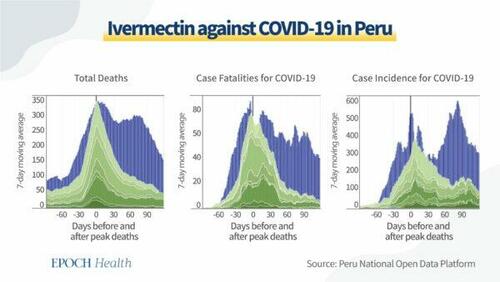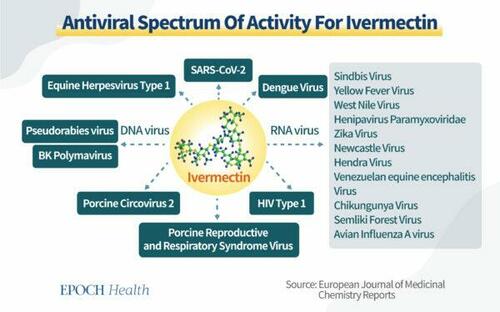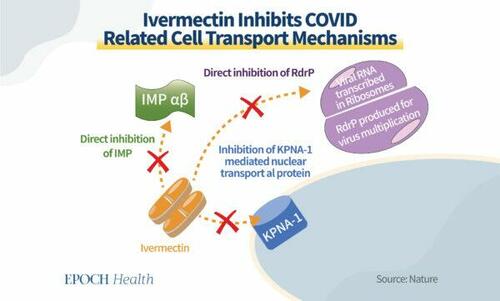Revenues of $62.8 billion for the First Quarter, a 5.4 Percent Increase Year-Over-Year
First Quarter GAAP Diluted EPS of $2.33 and Adjusted Diluted EPS of $2.71Adjusted Diluted EPS Guidance Range Raised to $11.50 to $11.75 for Fiscal 2023
Revenues of $62.8 billion for the First Quarter, a 5.4 Percent Increase Year-Over-Year
First Quarter GAAP Diluted EPS of $2.33 and Adjusted Diluted EPS of $2.71Danish drug developer Novo Nordisk on Wednesday presented "strong" sales expectations for 2023 and announced heavy investments into its production capacity, but warned of supply constraints on its best-selling drug.
Novo Nordisk, which develops diabetes and obesity drugs, said it expected "periodic supply constraints" this year, partly driven by higher than expected demand for its blockbuster diabetes drug, Ozempic, and manufacturing constraints.
"Supply of Ozempic cannot keep up with demand in some markets," Novo's Chief Financial Officer Karsten Munk Knudsen told journalists on Wednesday, but said Ozempic was available in the United States, the firm's biggest single market.
Shortages of human growth hormone would also cause sales in its rare disease franchise to drop by a "mid-single digit" percentage in 2023, as its Norditropin drug would be out of stock in certain markets, Knudsen said.
Novo however expects both sales and operating profit growth in local currencies in 2023 to be in a range between 13% and 19%, "strong" guidance according to Jyske Bank analyst Henrik Hallengreen Laustsen.
"Hopefully we'll get a whole year where Wegovy sales are allowed to flourish, so that's definitely something that pulls up the guidance for 2023," Laustsen told Reuters.
Sales of the company's new obesity drug, Wegovy, grew nearly 300% in local currencies last year, despite having faced serious supply issues throughout the year. In December, all doses of Wegovy were made available again to patients in the United States, Novo said.
GSK PLC on Wednesday posted rising earnings and sales for the fourth quarter, which the company said were boosted by its specialty medicines and vaccines businesses.
The British pharma major reported net profit of 1.50 billion pounds ($1.85 billion) in the fourth quarter, up from GBP749 million for the same quarter of 2021, on sales that grew to GBP7.33 billion from GBP7.08 billion.
Operating profit increased to GBP1.87 billion from GBP492 million in the fourth quarter of 2021, reflecting fair-value gains on investments, milestone income from disposals and lower remeasurement charges for contingent consideration liabilities, GSK said.
After-tax profit also increased, rising to GBP1.62 billion from GBP930 million the previous year.
Total earnings per share rose to 36.5 pence from 18.5 pence in 2021, and adjusted earnings per share increased to 25.8 pence from 23.6 pence, GSK said.
The company reported a gain from the demerger of its consumer healthcare business--now named Haleon PLC--of GBP10.1 billion for the full year.
GSK's vaccines business was driven both in 2022 and in the fourth quarter by sales of its shingles shot Shingrix, which generated GBP3 billion in the full year and GBP769 million in the final quarter. GSK's specialty medicines division was driven by growth in all therapeutic areas and totaled sales of GBP2.68 billion in the fourth quarter, the company said.
For 2023, the company said it expects turnover to increase between 6% and 8%, while adjusted operating profit is seen increasing between 10% and 12%. Earnings per share are expected to rise between 12% and 15%, GSK said. The guidance excludes any contribution from Covid-19 solutions, which aren't expected to generate any significant sales or operating profit in the current year, GSK said. Sales of Covid-19 solutions were GBP2.4 billion in 2022. For 2023, the company expects a reduction in turnover growth by about 9% and a reduction in adjusted operating profit growth by 6% to 7%, it said.
"Despite the recovery of healthcare systems, uncertain economic conditions prevail across many markets in which GSK operates and we continue to expect to see variability in performance between quarters," the company said.
Novartis on Wednesday predicted that core operating income would grow in a "mid single digit" percentage range in 2023 following stagnation last year, as the Swiss drugmaker prepares to spin off its Sandoz generics business.
Full-year core operating income was broadly flat at $16.7 billion, it said in a statement, coming in slightly below market expectations of $16.8 billion.
Adjusted for overall negative currency effects, group sales in 2022 advanced 4% to $50.5 billion as gains from heart failure drug Entresto and multiple sclerosis (MS) drug Kesimpta were partly offset by competition from cheap generic copies of established MS drug Gilenya.
Novartis said it was on track to spin off its generics unit Sandoz in the second half of the year as part of its effort to sharpen its focus on its patented prescription medicines.
Analysts have welcomed a programme unveiled in 2022 to trim costs and cut 8,000 jobs and plans to focus on fewer therapy areas and drug technologies. But the market has been underwhelmed by prospects for medium-term growth from new drugs.
Novartis shares were down 1.3% in early trade on Wednesday and have fallen about 11% since January 2020, underperforming most rivals.
Credit Suisse analysts said that best-selling psoriasis and arthritis drug Cosentyx fell short of estimates as the company cited retroactive price cuts under the U.S. Medicaid programme for low-income households.
They were also disappointed by guidance for Sandoz's core operating income to decline by a "low double digit" percentage in 2023 due to cost inflation and investments to make it a stand-alone entity.
The market has been pinning hopes for future sales growth on wider use of breast cancer drug Kisqali and iptacopan, which is being tested against a rare genetic blood disorder, possibly challenging AstraZeneca's drugs Soliris and Ultomiris.
MS drug Kesimpta, which requires fewer injections than standard therapies, is expected to become Novartis' second largest growth driver in 2023, after Entresto.
https://finance.yahoo.com/news/1-novartis-says-operating-profit-063223556.html
As global demand for Covid-19 vaccines dries up, the program tasked with vaccinating the world’s poor has been negotiating urgently to try to get out of its deals with pharmaceutical companies for vaccines it no longer needs.
Pharmaceutical companies have so far refused to refund $1.4 billion in advance payments for now canceled doses, according to confidential documents obtained by The New York Times.
Gavi, the international immunization organization that purchased the vaccines on behalf of the global Covid vaccine program, Covax, has said little publicly about the costs of order cancellations. But Gavi’s financial records show the organization tried to stem the financial damage. If he can’t strike a more favorable deal with another company, Johnson & Johnson, he might have to pay even more.
Gavi is a Geneva-based nongovernmental organization that uses funds from donors, including the US government and the Bill and Melinda Gates Foundation, to provide childhood immunizations to low-income countries. At the start of the pandemic, he was tasked with buying Covid vaccines for the developing world armed with one of the largest humanitarian funding rounds ever and began negotiations with vaccine manufacturers.
These negotiations went badly at first. The companies initially closed the market organization, prioritizing high-income countries that were able to pay more to lock in early doses. Gavi eventually entered into agreements with nine manufacturers.
But the shots only started reaching developing countries in significant numbers in mid-2022. By the time Gavi had a steady flow of supplies, demand had begun to wane: countries with weak health systems struggled to deliver vaccines, and the dominance of the milder variant of Omicron undermined the motivation of people to get vaccinated. Today, Covax is winding down well short of its goal of vaccinating 70% of the population in each country.
Vaccine makers have made more than $13 billion from vaccines that have been distributed through Covax. Under the contracts, the companies are not required to return the deposits Gavi made to them to reserve the vaccines that were ultimately cancelled.
But in light of the number of vaccine doses Gavi has had to cancel, some public health experts have criticized the companies’ actions.
Covid vaccine makers have a special responsibility because their products are a societal good and most were developed with public funding, said Thomas Frieden, chief executive of global health nonprofit Resolve to Save Lives and former director of the United States Centers for Disease Control. and Prevention.
That’s a lot of money that could do a lot of good, he says.
He added that other major global health programs have budgets roughly equal to the amount vaccine makers keep. The whole polio eradication effort costs about $1 billion a year, and it’s a huge infrastructure, he said.
Gavi struck deals with Moderna, the Serum Institute of India and several Chinese manufacturers to cancel unnecessary doses, returning $700 million in prepayments, the documents show.
Another pharmaceutical company, Novavax, is refusing to repay an additional $700 million in deposits for injections it never delivered.
Gavi and Johnson & Johnson are locked in a bitter dispute over payment for the injections that Gavi told the company months ago it would not need, but the company produced anyway. Johnson & Johnson is now asking Gavi to pay an additional undisclosed amount for them.
Gavi had an indirect supply relationship with Pfizer; the Biden administration bought him a billion vaccines to donate through Covax. Last year, the United States revised its agreement with the company, converting an order for 400 million doses into future options. The company said it doesn’t charge any fees to change the order.
The terms of Gavis’ agreements were kept secret because they were with private companies. There has been no public accounting of what drug companies have gained from canceled vaccines.
https://www.nytimes.com/2023/02/01/health/covid-vaccines-covax-gavi-prepayments.html
by Jack Phillips via The Epoch Times (emphasis ours),
Microsoft co-founder and billionaire Bill Gates again responded to questions about his relationship with sex offender financier Jeffrey Epstein, saying that “there was never any relationship.”
“I had dinner with him and that’s all,” Gates said in response to a question from an Australia Broadcasting Corporation reporter. When pressed further, Gates said that “there never was any relationship of any kind” after being asked if there is a connection between Epstein and the Gates Foundation.
The reporter, Sarah Ferguson, asked if he regretted the relationship, saying that it went against the wishes of his ex-wife, Melinda. “You’re going way back in time. But yeah, I will say for the, you know, over [the] hundredth time that I shouldn’t have had dinners with him,” Gates said in the interview, published Jan. 30.
Ferguson noted that Epstein was involved in “sexually compromising people” and asked whether his ex-wife warned him about that. “No,” Gates said.
Gates, one of the wealthiest people in the world, was asked in 2021 by PBS NewsHour anchor Judy Woodruff about whether he had a connection to Epstein or not. Gates at the time provided similar answers but stated that he had “dinners” with Epstein, whereas in Australian TV interview, he said that he had “dinner” with him.
“What did you know about him when you were meeting with him, as you said yourself, in the hopes of raising money?” Woodruff asked Gates
“You know, I had dinners with him. I regret doing that,” he replied. “He had relationships with people he said, you know, would give to global health, which is an interest I have. You know, not nearly enough philanthropy goes in that direction.”
Gates conceded at the time that “those meetings were a mistake.”
“You know, that goes back a long time ago now, so there’s nothing new on that,” Gates added.
Pressed further by Woodruff, the Microsoft mogul asserted: “You know, I’ve said I regretted having those dinner, and there’s nothing … absolutely nothing new on that.”
Melinda French Gates, his former wife, told CBS in 2022 that she wasn’t happy that he had meetings with Jeffrey Epstein. “I wanted to see who this man was, and I regretted it from the second I stepped in the door,” she said at the time. “He was abhorrent. He was evil personified. I had nightmares about it afterwards. My heart breaks for these young women.”
Before the CBS interview aired, Bill Gates told news outlets that his meeting with Epstein “was a mistake that I regret deeply” and was “a substantial error in judgment.”
Gates told The Times of London in May that those dinners were a part of efforts to fundraise but “didn’t result in what he purported, and I cut them off.” He added, “At the time, I didn’t realize that by having those meetings it would be seen as giving him credibility. You’re almost saying, ‘I forgive that type of behavior,’ or something.”
Epstein, who was convicted in 2008 after pleading guilty to soliciting a prostitute who was a minor, died in August 2019 while he was awaiting trial on sex trafficking charges. Officials found him hanged inside his Manhattan jail cell, triggering widespread speculation about his cause of death.

The New York City Medical Examiner’s office at the time ruled that Epstein, 66, committed suicide by hanging himself with his bedsheets. But in early 2020, Michael Baden, a forensic pathologist who previously worked for the same medical examiner’s office, alleged Epstein’s death was “more indicative of homicide” after graphic photos of his death were made public.
A former associate and girlfriend of Epstein, Ghislaine Maxwell, was found guilty in 2021 of child sex trafficking in connection to the former financier. She was sentenced in 2022 to 20 years in prison and is currently serving time in Florida’s low-security FCI Tallahassee prison.
During a recent phone interview with a British television show, Maxwell suggested that Epstein didn’t kill himself.
“I believe that he was murdered,” Maxwell said in a Talk TV interview published on Jan. 23. “I was shocked. Then I wondered how it had happened because as far as I was concerned, he was going to—I was sure he was going to appeal.”
Over the years, Epstein was reportedly known to have powerful friends and acquaintances, including politicians, business magnates, celebrities, and high-powered lawyers—further adding to the speculation around his jailhouse death.
https://www.zerohedge.com/political/bill-gates-addresses-jeffrey-epstein-connection-new-interview
by Dr. Sean Lin and Mingjia Jacky Guan via The Epoch Times (emphasis ours),
China’s state-run medicare program recently failed to reach an agreement with Pfizer to import more Paxlovid, claiming the COVID-19 treatment drug is too expensive. This is despite the drug being offered to the state at a reduced rate in comparison with that offered to other developed countries. Lack of Paxlovid will leave only Azvudine, an anti-HIV drug the Chinese communist regime rushed through development and re-branded as an anti-COVID drug, as a treatment option.
Given the recent explosive spread of COVID and the resulting skyrocketing rates of hospitalization, finding viable treatment options is paramount.
When the Delta variant broke out in 2021 across India, many states offered ivermectin population-wide. The efficacy of ivermectin in treating early and mild COVID-19 infections was confirmed in large states such as Uttar Pradesh—home to 241 million residents—where the use of the prophylactic dramatically reduced both the infection rate and the death toll.

Even among frontline health care workers, ivermectin proved to be an effective prophylactic against COVID-19. One study with 3,532 frontline health care workers from the All India Institute of Medical Sciences Bhubaneswar found that two doses of oral ivermectin (300 μg/kg given 72 hours apart) as chemoprophylaxis among health care workers reduced the risk of COVID-19 infection by 83 percent in the following month.
In Peru, mass ivermectin treatments were conducted through a broad-scale effort called Mega-Operación Tayta, or MOT for short. Operation MOT was led by the Peruvian army and involved 10 states, where the excess death rate saw a sharp decline with an average of 74 percent over 30 days. In 14 states where ivermectin was administered locally, the mean reduction in excess deaths over 30 days compared with deaths was 53 percent.
Lima, the capital of Peru, where the distribution of ivermectin was restricted, saw only a 25 percent reduction in excess deaths. The findings of researchers, detailed in the diagram below, show infection numbers, deaths, and fatalities across Peruvian states which implemented ivermectin (blue) and those which did not (red). The conclusion is that a reduction in deaths correlated with the distribution of ivermectin with a statistically significant p-value of less than 0.002.

Ivermectin was discovered in Japan during the late 70s as a derivative of Avermectin, produced from a single organism isolated at the Kitasato Institute in Tokyo. Since then, ivermectin has played an immeasurable role in improving the lives of billions with its humble beginnings as an anti-parasitic drug.
Ivermectin, approved by the U.S. Food and Drug Administration and deployed worldwide since 1987, has made major inroads against two devastating tropical diseases—onchocerciasis and lymphatic filariasis. In addition, some topical forms of ivermectin are approved to treat external parasites like head lice and skin conditions such as rosacea.

In addition to its anti-parasitic effects, a 2022 study published in the European Journal of Medicinal Chemistry Reports found that ivermectin has a strong potency at low concentrations against many DNA and RNA viruses, including HIV-1, yellow fever, malaria, West Nile virus, Zika, dengue fever, etc.
According to the study, ivermectin has an amazing inhibitory effect across multiple species and can interrupt motility and reproduction in both arthropods (such as insects) and nematodes (such as roundworms). This explains why ivermectin is prescribed for parasite infections, and also sheds light on its potential as a prophylactic against vector-borne diseases. In insects and other arthropods specifically, it can interrupt the transmission of disease.
SARS-CoV-2 is a virus that takes over host cells to multiply in the body. To enter the host cells, the virus binds to the ACE-2 receptor on the surface of cells which grants them entry. Ivermectin prevents the bonding process by interfering with the virus’s spike proteins—this is the same mechanism the vaccines use.
If the virus slips past the cell membrane, its top priority is to infiltrate the brain of the cell—the DNA-containing nucleus—to start mass-producing itself. SARS-CoV-2 latches itself onto a special class of transport proteins called IMPs that have enough security clearance to enter the nucleus. In the case of a viral infection, ivermectin binds to these transport proteins and halts the interaction.

Ivermectin also inhibits the nuclear transport mechanism mediated by the KPNA-1 protein, which has a similar effect when compared with IMPs. Both proteins can enter the nucleus and ivermectin can effectively stop the virus from getting to the nucleus. In the event that the virus does manage to invade the nucleus—ivermectin also has a backup plan.
For example, when the virus has taken over and initialized self-replication, it does so through a protein called RdRp, which is at the centerpiece of viral replication—and is directly inhibited by ivermectin with very high efficacy.
Once COVID-19 reaches later stages, it may require intensive care for recovery. For example, white lung syndrome (a hallmark symptom of acute respiratory distress syndrome) now occurring in severe COVID infections in China, is a sign that the virus has deeply infected the lungs and may have caused cytokine storms (a severe immune reaction in the body) in patients.
Other complications that arise from COVID-19 involving the lungs are conditions such as pulmonary fibrosis and hypoxia. Hypoxia occurs when the virus infects lung tissue to the extent that the alveoli, tiny sacs of air at the end of lung branches responsible for oxygen exchange, become scarred causing a severe loss of oxygen in the body.
Cytokines and chemokines are responsible for inflammation, a natural immune system response to foreign invaders. However, a large number of cytokines released into the body all at once can cause a “cytokine storm,” wherein the body is flooded with armies of white blood cells that harm the body.
A cytokine storm can be triggered through the TLR-4 pathway by the virus. The same pathway also triggers the release of nitric oxide, causing fluid leaks, dilating blood vessels, or even sepsis and fluid buildup in the lungs.